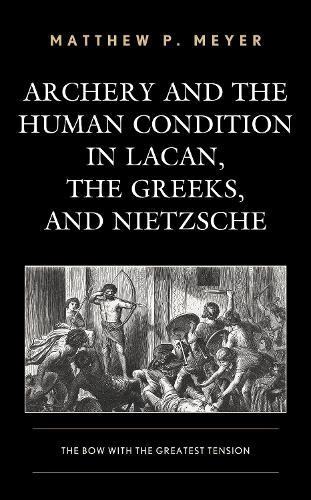
Archery and the Human Condition in Lacan, the Greeks, and Nietzsche: The Bow with the Greatest Tension
(Hardback)
Publishing Details
Archery and the Human Condition in Lacan, the Greeks, and Nietzsche: The Bow with the Greatest Tension
By (Author) Matthew P. Meyer
Bloomsbury Publishing PLC
Lexington Books
18th October 2019
United States
Classifications
Professional and Scholarly
Non Fiction
Cognition and cognitive psychology
Literature: history and criticism
128
Physical Properties
Hardback
218
Width 160mm, Height 228mm, Spine 18mm
485g
Description
Archery and the Human Condition in Lacan, the Greeks, and Nietzsche showcases archery as a metaphor for the fundamental tension at the heart of the human condition. Matthew Meyer develops a theory of subjectivity that incorporates elements from psychoanalysis, Greek literature, philosophy, and Zen archery, bringing together allusions to the bow and archery made by Sophocles, Homer, Heraclitus, Aristotle, Lacan, Nietzsche, and Awa Kenzo. The book weaves together a psychoanalytic account of infant development, the obstacles faced by Greek heroes, and virtue theory to explore the tension between the forces inside and outside of the human that subject it to conditions beyond its control. Meyer develops this side of the tension through Jacques Lacans theory of human drive, illustrating the three parts of drive theory through application to three works in Greek literature and philosophy. The second part of the text describes the other side of this fundamental tension--the ability to control drive impulsesthrough Aristotles use of the archer as a metaphor in his virtue theory. The book illustrates the productive nature of this tension through an analysis of Friedrich Nietzsches ideas about drives and sublimation, especially his contention that the highest types are like the bow with the greatest tension.
Reviews
Archery and the Human Condition offers unique and insightful exploration of cultural and psychological constructions the bow as a metaphor for the human condition. In this innovative and far-reaching analysis, Matthew P. Meyer invokes and illuminates the work of Heraclitus, Nietzsche, Lacan and several eastern philosophical and religious thinkers, weaving many historical threads into a seamless narrative. -- Carol Poster, independent scholar
Author Bio
Matthew P. Meyer is assistant professor of philosophy at the University of Wisconsin, Eau Claire.
